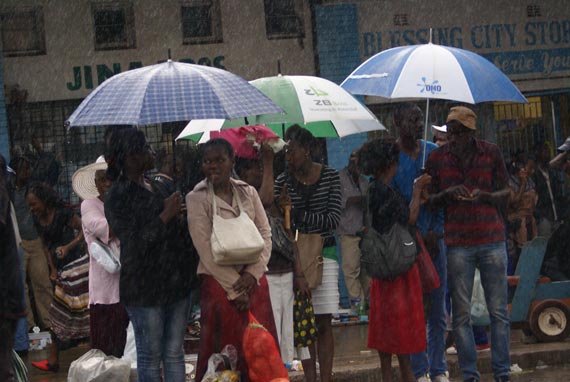
ALTHOUGH the rains have brought smiles to many in this drought prone part of the country, to a resident of Emganwini in Bulawayo, the heavy downpours have also piled miseries on her family.
NQOBANI NDLOVU STAFF REPORTER
Jennifer Nkala, a widow and mother of five children of school going age, has been living in darkness with her family for the past week since electricity went out after a sub-station transformer was blown out by lightning during a storm.
Nkala said since the blackout, she has been forced to part with at least $3 a day buying firewood for cooking and boiling water, and to her, this adds onto unnecessary, unbudgeted and unaffordable expenses.
A small pile of four pieces offirewood costs $1.
“That bundle is not enough to pull us through the day. I need about $3 per day to buy firewood. Not only that, I now also use R5 daily to buy candles as if we now live in the rural areas,” said Nkala.
She said vendors sold each candle for R2,50.
“A $1 bundle of firewood is enough to cook only breakfast and lunch. I therefore need to buy two more bundles to cook supper and warm up food when my children return home from school,” she said.
- Chamisa under fire over US$120K donation
- Mavhunga puts DeMbare into Chibuku quarterfinals
- Pension funds bet on Cabora Bassa oilfields
- Councils defy govt fire tender directive
Keep Reading
Nkala said the blackout had doubled her budget as under normal circumstances she only required $2 for bread and a $1 for eggs, but the cost of firewood and candles had increased it to about $7.
“Is the Zimbabwe Electricity Supply Authority (Zesa) going to refund us?”
The blackout was reported to Zesa, but nothing has been done to date.
Nkala said her children had to sometimes endure cold baths in the mornings in a bid to save the little firewood they can afford.
“This is because I cannot afford to buy firewood just for boiling water. It is torture to them but I have no option since it is not clear when exactly our electricity supplies will be restored.
“Having a hot bath in the morning is a luxury and on some days they have to forgo porridge so that we save the little that we have,” she said.
Nkala said she was in good books with residents in the section of Emganwini that has electricity and that is where she irons her family’s clothing and charges her mobile phone for free.
She also told Southern Eye that she misses South African dramas and soapies on TV as a result of the blackout.
“If I was young, I was going to accompany my kids to sections where there is electricity to watch TV. I miss those programmes.”
Nkala said what miffed her most is that her electricity bill will not reflect the ordeal that she and her family have gone through for the past week.
“It is a well-known fact that the load shedding regime has been there for years but still you cannot find any person saying they are now used to them and now this.
“We beg Zesa to restore electricity because this is unbearable. They should compensate us by not billing us this month,” she indicated.
Zesa regional manager Lovemore Chinaka and the power utility’s national spokesperson Fullard Gwasira had still not replied to questions e-mailed to them on Monday over the rain induced blackouts.
A Bulawayo-based commentator Zibusiso Dube said Zesa would remain a failure unless it replaced its ageing infrastructure.
“I believe it’s a sign that Zesa is failing in its mandate to provide electricity and in a modern society, this is a travesty of justice,” he said.
“This is more so in light of the fact that some of those people may be having prepaid metres that they have credited using their hard-earned cash.
“Zesa should improve its operations and ensure that it performs according to its mandate. The onus is on the institution to ensure that it maintains its infrastructure to avoid such inconveniences to residents when it rains,” Dube added.
Zesa is on record saying over $1 billion was required for the rehabilitation of its equipment but with huge debts and the growth of urban settlements, the cash strapped power utility faces a mammoth task.










